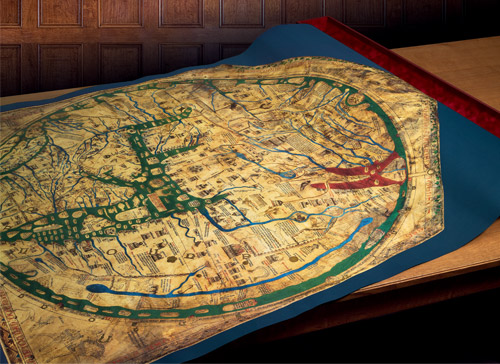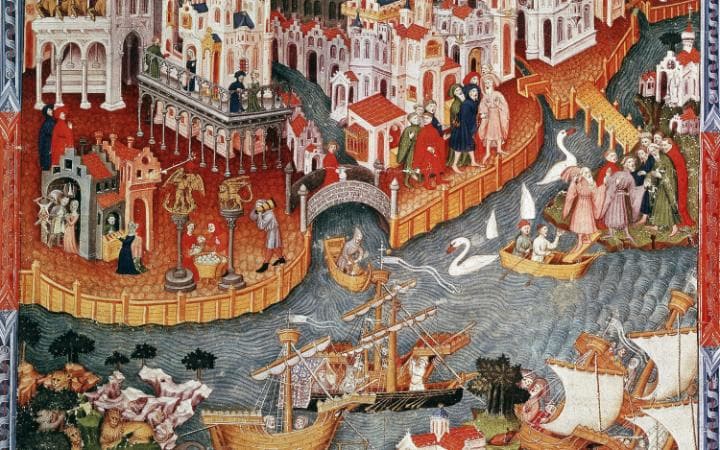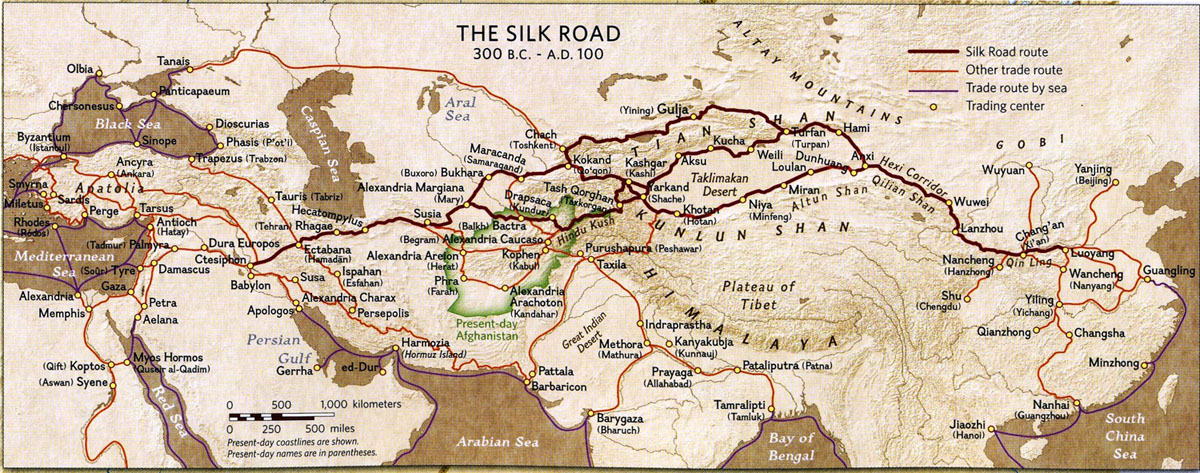|
As a teenager, Peter Frankopan told us in his spellbinding talk on April 28th, he was uneasy about the narrow geographic focus in history which seemed to concentrate solely on the United States and Western Europe, leaving the rest of the world largely untouched. He told us that he had been taught about the Romans in Britain, the Norman conquest of 1066; Henry VIII and the Tudors; the American War of Independence; Victorian industrialisation; the Battle of the Somme and the rise and fall of Nazi Germany.
However, there were huge areas of the world which remained untouched. Peter was then given a book which challenged this "lazy" view of history - that Ancient Greece lead to Rome, which led to Christian Europe and the Renaissance and the Enlightenment, triggering political democracy and the industrial revolution. Even as a youngster, he realised this interpretation was flawed - and that the regions he was not being taught about at school had become lost by the insistent story of the rise of Europe.

He was taken to see the Mappa Mundi in Hereford Cathedral, which had Jerusalem as its focus, and also read about Arab geographers whose work put the Caspian Sea at its heart. Peter told us he was transfixed and this was compounded when he heard of an important medieval Turkish map in Istanbul, which had a city called Balasaghun at its heart - a place of which he had never heard and yet it was considered at one stage to be the centre of the world.
Years later, this reappraisal would bear fruit in his best-seller, The Silk Roads, which has topped lists around the world - and has even sold more copies than J.K. Rowling in China. He said he wanted to know about Russia and Central Asia, Persia and Mesopotamia - and he was fascinated with the origins of Christianity when viewed from Asia and how the Crusades must have looked to those living in the great cities of the Middle Ages, such like Constantinople, Jerusalem, Baghdad and Cairo. And he was keen to understand how two world wars were seen when viewed - not from Flanders or the eastern front, but from Afghanistan and India.
Peter suggested a great deal of attention is currently given to the impact of economic growth in China, where demand for luxury goods is set to quadruple in the next decade - or looking at social change in India, where more people now have access to a mobile phone than a flushing toilet. But he emphasised that neither offers a viewpoint of the world's past - and that, in fact, for millennia it was the region lying between east and west, linking Europe with the Pacific Ocean, that was the axis on which the globe spun.

To many, he added, countries in central Asia - such as Kazakhstan, Uzbekistan, Kyrgyzstan Turkmenistan and the countries of the Caucusus - are these days seen as unstable, violent and a threat to international security, like in Iraq, Syria and Afghanistan. He said they have a poor record on human rights and freedom of expression is limited in faith, conscience and sex equality - but whilst these countries might seem wild, Peter said they are certainly not backwaters or obscure wastelands.
Far from being on the fringe of global affairs, he added, these countries lie at the very heart and have done so since the beginning of history. It was here where civilisation was born and where many believe Mankind was created in the Garden of Eden - widely thought to be located in the rich fields between the Tigris and Euphrates. It was in this bridge between east and west that great metropolises were established nearly 5,000 years ago - where the cities of Harappa and Mohenjo-Daro in the Indus valley were wonders of the ancient world. Inhabitants numbered tens of thousands and had a sewage system that would not be matched in Europe for a thousand years.
Other great centres of civilisation such as Babylon, Nineveh, Uruk and Akkad, in Mesopotamia, were famed for the grandeur of their architecture. Peter added that this region is where the world's great religions burst into life - Judaism, Christianity, Islam and Buddhism and Hinduism - and it is the region where the language groups competed. And it is also where the great empires rose and fell. During his research, it showed a world that was profoundly inter-connected - and that whatever happened in the steppes of Central Asia could be felt in North Africa, and where events in Baghdad resonated in Scandanavia.
Peter described the way these "tremors" fanned out in every direction, along which pilgrims and warriors, nomads and merchants have travelled and goods and produce bought and sold - whilst ideas were exchanged and adapted (although these routes have also carried violence and disease). In the late 19th Century, this sprawling web of connections was given a name of the Silk Road by a German geologist, Ferdinand von Richtofen, uncle of the First World War flying ace, the "Red Baron". Peter described these pathways as the world's central nervous system connecting people and places and yet, despite the importance of its part in the world, he claimed it has been forgotten by mainstream history - partly because of the view of "orientalism", the strident and negative view of the east as being undeveloped and inferior and, therefore, unworthy of study.

He admits that current religious fundamentalism and sectarian violence have tarnished the image of places such as Herat in Afghanisatn, Fallujiah and Mosul in Iraq, or Aleppo and Homs in Syria. But he claimed the present had washed over the past - such as the days when the name of Kabul conjured up images of gardens planted and tended by the great Babu, founder of the Moghul empire in India. In the same way, said Peter, modern impressions of Iran have obscured the glories of its more distant history - when its Persian predecessor dominated everything. Urban centres spurred on rivalry between rulers, prompting ever more ambitious architecture and spectacular monuments, whilst libraries, places of worship, churches and observatories dotted the region, connecting Constantinople to Damascus, Isfahan, Kabul and Kasgar. For centuries, the intellectual excellence in the world was not located in Europe - but in Baghdad, Bukhara and Samarkand.
Hence, there were good reasons why the cultures, cities and people living along the Silk Road developed and advanced - trading and learning from each other. However, Peter suggested the mantle of progress shifted during the early modern period as a result of two great maritime expeditions that took place in the 15th Century - when the foundations were laid for a major disruption to the rhythm of long established systems of exchange. Expeditions by Christopher Columbus and Vasco da Gama opened up new sea routes and suddenly Europe was transformed from a regional backwater into a fulcrum of sprawling communities and - at a stroke - it became the new mid-point between east and west.
As well a best-selling author, Peter is also Director of the Oxford Centre for Byzantine Studies at Oxford University. In addition to his academic studies, he has both played and sung on several albums and he also chairs a collection of family businesses in several countries, including A Curious Group of Hotels, which he set up with his wife, Jessica, and includes Cowley Manor, near Cheltenham.
He concluded his talk by saying he hoped those reading The Silk Roads might be inspired to look at history in a different way. Over 140 people packed the hall and the level of fascination was reflected in the large number of books that were sold.
"Peter's talk was utterly remarkable. I can't recall when I listened to such a brilliant analytical brain on full-throttle. His assessment was sensational in how different regions of the world have seen their history diluted through teaching concentrating largely on European history. It added supreme detail on how cultures of the Middle and Far East developed in so many areas, often centuries before their European counterparts. Peter's talk was enlightening, incisive, witty and quite astonishing, with no repetition and no notes. What a total star! - Jim Oakley, Oxford
|